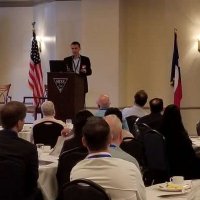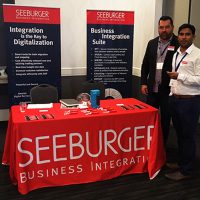Highlights of PIDX 2019 International US Fall Conference

PIDX provides a global forum for delivering the process, information and technology standards that facilitates seamless, efficient, electronic business within the oil and gas industry and its trading community.
The Changing Oil and Gas industryThe SEEBURGER team attended the PIDX conference in Houston in October. The four main topics facing the oil, gas and chemical industry that were discussed include:
|
The evolving industry:
Just as global warming, climate change and the development of global fossil resources have become fixtures in the news, they are also major topics for oil and gas organizations. At the PIDX Fall Conference, industry leaders such as BP and ExxonMobil described their challenges and how they’ve started thinking about how to manage these issues today and into the future. Members of PIDX also discussed climate issues, and how the creation of carbon dioxide influences their operations.
Right now, mitigating climate change and meeting the growing demand for energy are two contrary, yet pressing challenges. As a result, daily operations of IT and lines of business are being influenced by the switch from coal or oil to gas, increasing renewables, and the creation of more energy with a lower carbon-dioxide mix. More and more oil and gas companies have evolved into energy companies as they can no longer depend solely on fossil resources.
The vision of the industry has changed to providing energy through a sustainable mix of resources with less impact on climate change and less creation of carbon dioxide.
As the industry evolves, PIDX standards will evolve, so that PIDX can become part of that vision: It is energy – not just oil & gas.
Expanding standards:
Speeding up processes for faster invoicing, availability of process information, and digitization are increasing the demand for standardization across the industry. To extend these standards to haulers and carriers, the group discussed adaptation of message and/or record structures, research of comparable standards in other industries for ideas, and definition of terminology. Haulers and carriers were asked for feedback, and even though it’s early in the process, it is clear that their process documentation requirements are different than other parts of the industry.
Other feedback includes that it is important to be provided the right level of detail on standards, and that handling updates is difficult at this point. Standardized requirements and tools to facilitate the broadcasting of updates would be useful. The consensus was that common standards need to be developed and that any additional feedback from outside the current PIDX ecosystem is highly appreciated.
Blockchain and the challenge of new technology:
Besides the activities of the Oil+Gas Block Chain Consortium (OOC) to build an industry framework, companies struggle with both where to start with this new technology, and how to trust the flow of data and information. As a simple overview, the entire blockchain is driven by business, technology and industry domains. The different domains are either influenced by the industry, or controlled by solution providers, service companies and oil and gas companies. In the background, the technology evolves from the IT perspective based on open-source communities.
Technology and deployment can be decentralized whereas certain permissions could be centralized by a control group. Blockchain control and who and what influences and controls the blockchain are major topics that are being discussed right now.
This, together with the question of where to start (fork approach or green field?), and (just in case) how to roll back if needed, are just some of the challenges of blockchain.
REST/JSON as PIDX standard:
EDI and XML are part of the daily PIDX discussions and workgroups. Most of the PIDX members are familiar with such message structures and also know how and where to use them. REST services and JSON data interchange format are one of the newer PIDX workgroup initiatives.
Most newer solutions offer modern interoperability functionality and their technology is based on fast and secure access to their data and information. Defining REST APIs and JSON messaging formats makes PIDX an enabler for interoperability and also helps the industry to adopt modern standards and integrate with mobile devices and API-based architecture.
Summary:
“Automation” was the keyword for the PIDX fall conference. Along with new technology and different processes, automation requires spreading and expanding industry standards. Technologies like blockchain, but also basic technical capabilities like REST APIs have already become part of everyday business in the oil and gas industry.
SEEBURGER can help enable automation using our agile, secure and scalable integration platform. The SEEBURGER Business Integration Suite (BIS) helps to onboard new solutions and partners faster, while reducing costs. SEEBURGER fulfills standardization requirements for PIDX and is capable of meeting future needs for digital services and APIs using REST or JSON web services. SEEBURGER’s industry-leading solutions are available on any cloud, as hybrid or on-premises deployments, and together with the SEEBURGER professional services team and their agile implementation methodology, we help you go to market faster.
Learn more about how SEEBURGER can help your oil, gas or chemical company:
Thank you for your message
We appreciate your interest in SEEBURGER
Get in contact with us:
Please enter details about your project in the message section so we can direct your inquiry to the right consultant.
Written by: Jan Kirsch
Jan Kirsch, SVP Utilities, Oil, Gas and Chemicals, is responsible globally for a whole industry vertical. Jan has more than 20 years’ experience working with energy and utility companies providing architectural advice and solutions for business integration and digital transformation. His areas of experience include IT architecture, Business Development and Consulting for EAI, Data Integration, Portals and B2B communication. Prior to working for SEEBURGER, he was in several consulting and management roles. In his spare time, Jan enjoys spending time with his family and is a huge fan of classic American muscle cars.





